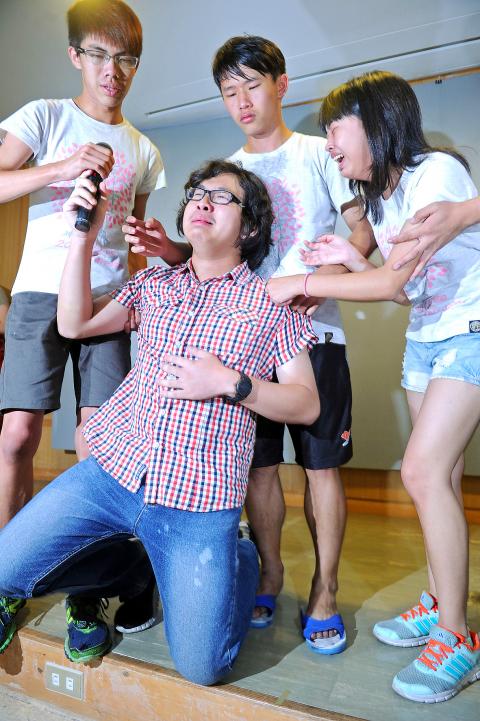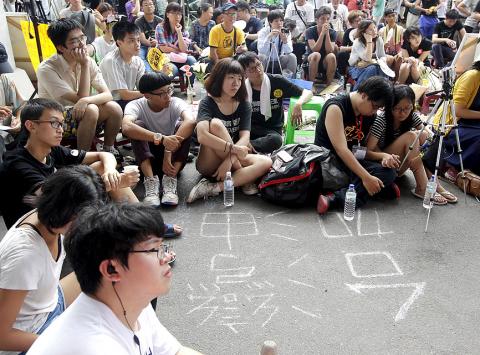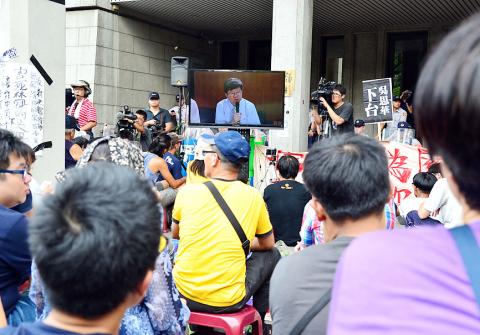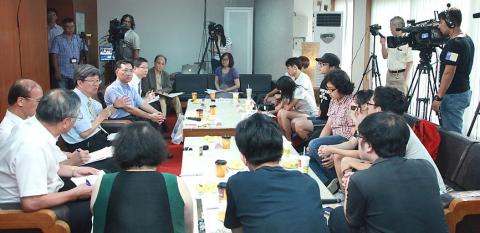Talks between Minister of Education Wu Se-hwa (吳思華) and students over the curriculum controversy fell apart yesterday, with students storming out of a Ministry of Education (MOE)-sponsored forum in tears.
“What in the world are these talks supposed to be?” Northern Taiwan Anti-Curriculum Changes Alliance convener Chu Chen (朱震) said. “What I see is a failure of education and a policy that has gradually moved away from the masses.”
“We are willing to accept a suspension of the implementation [of changes to curriculum guidelines] — all that is needed is those few words,” he said, repeatedly breaking into tears. “Only that would count as respect, without which, all we are left with, other than pain, is a hatred of the government and education.”

Photo: CNA
Wu repeated his position that it is administratively impossible for the guidelines to be withdrawn, because they have already gone into effect.
“I am truly willing to allow schools to make the decision about textbook choices. I think this is the solution to the problem,” Wu said when asked if the ministry could postpone implementation until next year.
The ministry’s policy of allowing schools to choose whether to use pre-adjustment textbooks represented the “maximum” it could do, he said, urging students to “return to school” and ask their teachers to keep using old textbooks if they disagree with guideline adjustments.

Photo: Reuters
After Wu’s rejection, Chu rushed from the meeting room in tears, shouting: “I am so sorry Dai Lin (林冠華),” referring to a student whose suicide on Thursday last week, allegedly in protest against changes to high-school curriculum guidelines, sparked the latest wave of student protests against the controversial adjustments, in which student protesters have occupied the ministry’s forecourt since Friday last week.
Chu was followed out the room by the few remaining student protesters, including Yi Juo-yu (伊若宇), who threw a badge at Wu, calling him “shameless” and promising to “look him up” later.
Prior to Chu’s outburst, most of the other students had already left the meeting in protest after Wu refused to make concessions, only to rush back and bang on the meeting door, saying that they needed to “save” Chu after he started to cry.

Photo: Wang Yi-sung, Taipei Times
In a tear-filled news conference afterward, students expressed their frustration with the ministry.
“Today is the day that Taiwan’s history and education died,” National Taichung First Senior High School Apple Tree Commune Club spokesperson Chen Chien-hsun (陳建勳) said. “All that the death of a student has gained is the education minister telling us that we should ‘look to the future.’ What is that supposed to mean?”
“Today we compromised and told the ministry that we could accept a ‘suspension’ or ‘freezing’ [of the implementation of curriculum guideline adjustments] because we are tired and we do not want anyone else to be hurt,” he said, falling to his knees as he apologized to protesters.

Photo: Liu Hsin-de, Taipei Times
Yesterday’s talks between Wu and student representatives at the National Central Library in Taipei focused on accusations of irregularities in the process under which the guidelines were adopted, with students citing the absence of academics of Taiwanese history from the review committee and the ministry’s loss in a lawsuit on procedural openness in calling for a suspension.
In response, Wu repeated previous ministry talking points, including that a Control Yuan investigation had found no problems with the procedures and that the ministry had a responsibility to protect the privacy of academics who participated in the guideline’s review committee.
Wu arrived 10 minutes late for the forum, and at one point rolled his eyes in response to comments made by National Taiwan University history professor Hua Yih-fen (花亦芬), who accompanied the students.
She told him that there would be no way to “help” him if he kept using “bureaucratic verbal tricks” and “administrative procedures” to respond to the students.
Deputy Minister of Education Lin Teng-chiao (林騰蛟) after the forum finished announced four concessionary displays of “good will” to the students, including a promise to reveal the names of members of the guideline review committee members within 10 days of asking their permission, adding an appendix on controversial terminology to the outlines, guaranteeing schools the right to select their own textbooks and initiating a “rolling review” of the review process.
He said the event was a “good start” for communication between the ministry and students, adding that the ministry was open to arranging further meetings.
Although the ministry had previously suspended implementation of the original 2009 curriculum guidelines, the current round of adjustments could not be suspended, because it had already been implemented, he said, adding that suspension would put the ministry on the line to cover the losses of publishers that have already revised textbooks.
The ministry would investigate the possibility of covering the losses of schools that wish to switch back to old textbooks, he said. Most schools had already completed the textbook selection process when the ministry announced in June that schools were free to continue using the old versions of textbooks.
At press time last night, a large crowd remained in the ministry’s courtyard, with student representatives saying that they would announce their next steps today.

Tropical Storm Gaemi strengthened into a typhoon at 2pm yesterday, and could make landfall in Yilan County tomorrow, the Central Weather Administration (CWA) said yesterday. The agency was scheduled to issue a sea warning at 11:30pm yesterday, and could issue a land warning later today. Gaemi was moving north-northwest at 4kph, carrying maximum sustained winds near its center of up to 118.8kph and gusts of 154.8kph. The circumference is forecast to reach eastern Taiwan tomorrow morning, with the center making landfall in Yilan County later that night before departing from the north coast, CWA weather forecaster Kuan Shin-ping (官欣平) said yesterday. Uncertainty remains and

SEA WARNING LIKELY: The storm, named Gaemi, could become a moderate typhoon on Wednesday or Thursday, with the Taipei City Government preparing for flooding A tropical depression east of the Philippines developed into a tropical storm named Gaemi at 2pm yesterday, and was moving toward eastern Taiwan, the Central Weather Administration (CWA) said. Gaemi could begin to affect Taiwan proper on Tuesday, lasting until Friday, and could develop into a moderate typhoon on Wednesday or Thursday, it said. A sea warning for Gaemi could be issued as early as Tuesday morning, it added. Gaemi, the third tropical storm in the Pacific Ocean this typhoon season, is projected to begin moving northwest today, and be closest to Taiwan on Wednesday or Thursday, the agency said. Today, there would likely

DISRUPTIONS: The high-speed rail is to operate as normal, while several airlines either canceled flights or announced early departures or late arrivals Schools and offices in 15 cities and counties are to be closed today due to Typhoon Gaemi, local governments announced last night. The 15 are: Taipei, New Taipei City, Taoyuan, Tainan, Keelung, Hsinchu and Kaohsiung, as well as Yilan, Hualien, Hsinchu, Miaoli, Chiayi, Pingtung, Penghu and Lienchiang counties. People should brace for torrential rainfall brought by the storm, with its center forecast to make landfall on the east coast between tonight and tomorrow morning, the Central Weather Administration (CWA) said. The agency issued a sea warning for the typhoon at 11:30pm on Monday, followed by a land warning at 11:30am yesterday. As of

CASUALTY: A 70-year-old woman was killed by a falling tree in Kaohsiung as the premier warned all government agencies to remain on high alert for the next 24 hours Schools and offices nationwide are to be closed for a second day today as Typhoon Gaemi crosses over the nation, bringing torrential rain and whipping winds. Gaemi was forecast to make landfall late last night. From Tuesday night, its outer band brought substantial rainfall and strong winds to the nation. As of 6:15pm last night, the typhoon’s center was 20km southeast of Hualien County, Central Weather Administration (CWA) data showed. It was moving at 19kph and had a radius of 250km. As of 3pm yesterday, one woman had died, while 58 people were injured, the Central Emergency Operation Center said. The 70-year-old